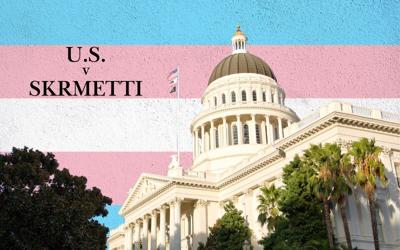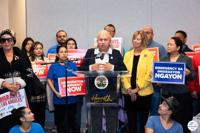The U.S. v Skrmetti case has been on the Supreme Court’s radar since November 2023, when a writ of certiorari petition was filed on behalf of Jonathan Thomas Skrmetti and 2 other families.
On December 4, the Supreme Court heard oral arguments in the lawsuit that states the Tennessee ban on gender-affirming healthcare for youth is unconstitutional and violates the Fourteenth Amendment.
The question presented was whether Tennessee Senate Bill 1, which prohibits all medical treatments or courses of action intended to treat gender dysphoria or affirm gender transitions for youth, violates the Equal Protection Clause of the Fourteenth Amendment or Section 1557 of the Affordable Care Act, which prohibits sex-based discrimination.
The far-reaching impacts of U.S. v Skrmetti are being felt even prior to the decision of the case. The Washington Post recently reported that following the results of the presidential election, LGBTQ+ Americans began stockpiling gender-affirming medications and making plans to move out of states that have not taken the necessary steps to provide sanctuary. This is reminiscent of reports earlier this year pointing toward a trend of women and non-male people stockpiling on abortion medication following the overturning of Roe v Wade in 2022.
Samantha and Brian Williams’ daughter, the trans teen at the center of this case, spoke about her perspective in a published case brief by the American Civil Liberties Union.
“I don’t even want to think about having to go back to the dark place I was in before I was able to come out and access the care that my doctors have prescribed for me,” she said. “I want this law to be struck down so that I can continue to receive the care I need, in conversation with my parents and my doctors, and have the freedom to live my life and do the things I enjoy.”
Understanding the case
Tennessee SB 1 is codified under section 68-33-103, states that a healthcare provider should not perform or offer to perform medical procedures with the purpose of treating discomfort or distress relating to gender dysphoria, except when it is explicitly necessary to treat defects, physical injury or diseases.
Under this code, it is also explicitly stated that “gender dysphoria, gender identity disorder, gender incongruence, or any mental condition, disorder, disability or abnormality,” count as a “disease.” That section of the code summarized above, specifically states that the only exceptions to the ban on trans healthcare are to treat defects, injuries or diseases. Meaning that the language here intentionally points toward closing a loophole that would allow patients to get treatment if being transgender was considered a disease.
If the Supreme Court sides with Tennessee, this could set the path for states to deny gender-affirming care to youth on the state level, affecting progress in many states like Colorado, Michigan, Maine and Rhode Island.
In August, the Human Rights Campaign listed Tennessee along with a dozen other states, stating they are all in current litigation proceedings challenging similar bans targeting trans youth. HRC published a map to track the legislation in a total of 26 states that have current bans on gender-affirming care in the U.S.
This case also marks the first time the Supreme Court has directly considered how the Equal Protection Clause in the fourteenth amendment applies to trans, gender nonconforming and intersex youth.
What’s to be determined
The Supreme Court will directly consider how the Equal Protection Clause would apply to gender-affirming care for youth.
The standard of that review is to be determined, which is how the case will be addressed, based on a level of scrutiny. There are 3 levels of scrutiny that determine how a law will be evaluated: strict scrutiny, intermediate scrutiny and rational basis review.
With strict scrutiny at the highest level, the first transgender lawyer to argue before the Supreme Court, Chase Strangio, argued that this case should be treated with skepticism, or the highest level of scrutiny, due to the law discriminating based on sex. Meaning, this law should be heavily questioned as to whether or not it violates the Constitution.
The Tennessee Att. General argued that the law does not make a sex classification and also argued that states have the power to regulate this issue without bringing in the skepticism of the Supreme Court.
This case will determine the precedent for future cases regarding human rights, freedoms and protections under The U.S. Constitution regarding healthcare.
The other part of the case to be determined, would be whether Tennessee could justify the ban.
At last Wednesday’s hearing, Justice Brett Kavanaugh and Justice Samuel Alito spoke in depth about the allegations raised by the state. They also discussed the level of effectiveness, against the levels of risk of gender affirming care. The sources that the Justices referenced have been determined by experts to be unreliable, biased, misleading and inaccurate. They argued that the state has a right to make a decision based on those sources, regardless of their credibility.
Solicitor General Elizabeth Prologar’s oral argument on behalf of the petitioner stated that this case is about access to medications that have already been safely prescribed and safely used for decades to treat a wide range of conditions, including but not limited to, gender dysphoria.
“But SB1 singles out and bans one particular use. In Tennessee, these medications can’t be prescribed to allow a minor to identify with or live as a gender inconsistent with the minor’s sex,” argued Solicitor General Porlogar.
Lambda Legal’s Nonbinary and Transgender Rights Project Director, Sasha Buchert commented on the case.
“Since 2021, 26 states have banned hormone therapies for transgender youth. These are all similar cases introduced by conservative state legislatures targeting trans youth and their families pushed by conservative and far-right groups using copy-cat legislation and peddling misinformation and conspiracy theories,” she explained in a Lambda Legal FAQ.
The California Perspective
Though it is believed that there won’t be a decision from the court until sometime in June 2025, local organizations and community leaders have begun to discuss how the future will shape up once SCOTUS makes a ruling.
Planned Parenthood in California, issued a statement following the oral arguments hearing.
“The Planned Parenthood affiliates in California know this playbook all too well and no matter what lies ahead, we are ready to fight to protect the right of transgender people, including youth, to access the care they need and deserve. While some states may be emboldened by the Supreme Court’s eventual decision in this case to criminalize critical health care services once again, California will continue to be a safe haven for transgender people and their health, safety, privacy, and well-being,” said Jodi Hicks CEO and president at Planned Parenthood Affiliates of California.
Bamby Salcedo, president and CEO of the Trans Latin@ Coalition has built her entire career and legacy on championing transgender rights and believes that if the Supreme Court decides to uphold Tennessee’s right to enforce this law, California will also eventually see itself challenged as a safe haven for trans youth, as well as adults.
“When we launched our policy agenda, we were going to focus the following legislative session in California, on a bill to reform Cal Aid and after the election, we had to rethink that because we know the state gets its funding from the federal government for [programs like] Medical and Medicare.”
Following last Wednesday’s hearing of oral arguments, Attorney General Rob Bonta reinforced California’s commitment toward protecting trans youth and their access to healthcare.
“Following oral arguments in U.S. v. Skrmetti in the Supreme Court, my office reaffirms our unwavering commitment to protecting the health and rights of transgender individuals to access medically necessary care,” said Attorney General Bonta.
“Laws such as Tennessee’s Senate Bill 1 are dangerous and discriminatory by denying transgender youth the critical, lifesaving care they need. Amid a growing wave of legislative attacks on LGBTQ+ rights, it is more important than ever to stand against these harmful measures. I urge the Supreme Court to protect the rights of transgender youth and ensure they are not denied the care they need to live full and authentic lives.”
In September, General Bonta led a multi-state coalition which included 20 attorney generals to challenge Florida’s law and administrative rule that severely limits access to gender-affirming care. He initially filed the amicus brief on May of last year, stressing California’s efforts and state responsibility in protecting transgender healthcare rights. In the brief, he also stressed the consequences of not receiving appropriate care.
Organizations like TransLatin@ Coalition, Bienestar Human Services and Equality California are amping up their voices and rolling up their sleeves to provide sanctuary, protections and resources to the LGBTQ+ and TGI communities.
The University of California, Los Angeles William’s Institute created an amicus brief which was submitted by Federal Policy Director Elana Redfield and Selendy Gay, a law firm based in New York, on behalf of Senior Scholar of Public Policy Jody Herman and Legal Director Christy Mallory. Herman and Mallory provided the court with appropriate and credible research to help the Justices understand the population affected by gender-affirming care bans and the impacts of the final ruling.
The final decision regarding healthcare for transgender youth won’t be made until June 2025 and regardless of what the outcome is, the decision will set a new standard for how transgender care, rights and issues will be viewed under the Constitution.











(0) comments
Welcome to the discussion.
Log In
Keep it Clean. Please avoid obscene, vulgar, lewd, racist or sexually-oriented language.
PLEASE TURN OFF YOUR CAPS LOCK.
Don't Threaten. Threats of harming another person will not be tolerated.
Be Truthful. Don't knowingly lie about anyone or anything.
Be Nice. No racism, sexism or any sort of -ism that is degrading to another person.
Be Proactive. Use the 'Report' link on each comment to let us know of abusive posts.
Share with Us. We'd love to hear eyewitness accounts, the history behind an article.